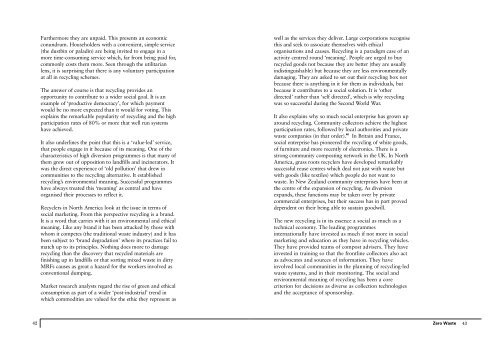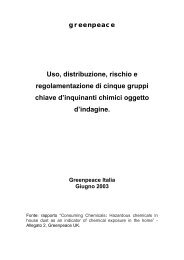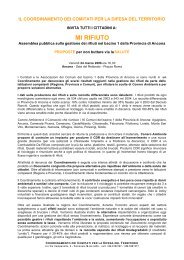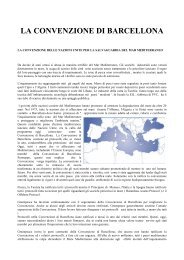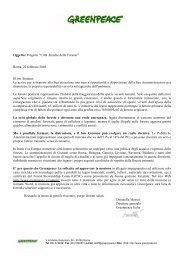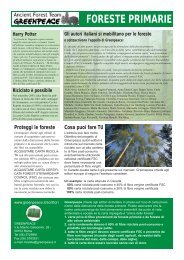Zero Waste by Robin Murray, Greenpeace Environmental Trust 2002
Zero Waste by Robin Murray, Greenpeace Environmental Trust 2002
Zero Waste by Robin Murray, Greenpeace Environmental Trust 2002
Create successful ePaper yourself
Turn your PDF publications into a flip-book with our unique Google optimized e-Paper software.
F u rt h e rm o re they are unpaid. This presents an economic<br />
c o n u n d rum. Householders with a convenient, simple serv i c e<br />
(the dustbin or paladin) are being invited to engage in a<br />
m o re time-consuming service which, far from being paid for,<br />
commonly costs them more. Seen through the utilitarian<br />
lens, it is surprising that there is any voluntary part i c i p a t i o n<br />
at all in recycling schemes.<br />
The answer of course is that recycling provides an<br />
o p p o rtunity to contribute to a wider social goal. It is an<br />
example of ‘productive democracy’, for which payment<br />
would be no more expected than it would for voting. This<br />
explains the remarkable popularity of recycling and the high<br />
p a rticipation rates of 80% or more that well run systems<br />
have achieved.<br />
It also underlines the point that this is a ‘value-led’ serv i c e ,<br />
that people engage in it because of its meaning. One of the<br />
characteristics of high diversion programmes is that many of<br />
them grew out of opposition to landfills and incinerators. It<br />
was the direct experience of ‘old pollution’ that drew in<br />
communities to the recycling alternative. It established<br />
re c y c l i n g ’s environmental meaning. Successful pro g r a m m e s<br />
have always treated this ‘meaning’ as central and have<br />
o rganised their processes to reflect it.<br />
Recyclers in North America look at the issue in terms of<br />
social marketing. From this perspective recycling is a brand.<br />
It is a word that carries with it an environmental and ethical<br />
meaning. Like any brand it has been attacked <strong>by</strong> those with<br />
whom it competes (the traditional waste industry) and it has<br />
been subject to ‘brand degradation’ where its practices fail to<br />
match up to its principles. Nothing does more to damage<br />
recycling than the discovery that recycled materials are<br />
finishing up in landfills or that sorting mixed waste in dirt y<br />
MRFs causes as great a hazard for the workers involved as<br />
conventional dumping.<br />
Market re s e a rch analysts re g a rd the rise of green and ethical<br />
consumption as part of a wider ‘post-industrial’ trend in<br />
which commodities are valued for the ethic they re p resent as<br />
well as the services they deliver. Large corporations re c o g n i s e<br />
this and seek to associate themselves with ethical<br />
o rganisations and causes. Recycling is a paradigm case of an<br />
activity centred round ‘meaning’. People are urged to buy<br />
recycled goods not because they are better (they are usually<br />
indistinguishable) but because they are less enviro n m e n t a l l y<br />
damaging. They are asked to set out their recycling box not<br />
because there is anything in it for them as individuals, but<br />
because it contributes to a social solution. It is ‘other<br />
d i rected’ rather than ‘self directed’, which is why re c y c l i n g<br />
was so successful during the Second World Wa r.<br />
It also explains why so much social enterprise has grown up<br />
a round recycling. Community collectors achieve the highest<br />
p a rticipation rates, followed <strong>by</strong> local authorities and private<br />
waste companies (in that ord e r ). 40<br />
In Britain and France,<br />
social enterprise has pioneered the recycling of white goods,<br />
of furn i t u re and more recently of electronics. There is a<br />
s t rong community composting network in the UK. In Nort h<br />
America, grass roots recyclers have developed re m a r k a b l y<br />
successful reuse centres which deal not just with waste but<br />
with goods (like textiles) which people do not want to<br />
waste. In New Zealand community enterprises have been at<br />
the centre of the expansion of recycling. As diversion<br />
expands, these functions may be taken over <strong>by</strong> private<br />
c o m m e rcial enterprises, but their success has in part pro v e d<br />
dependent on their being able to sustain goodwill.<br />
The new recycling is in its essence a social as much as a<br />
technical economy. The leading pro g r a m m e s<br />
i n t e rnationally have invested as much if not more in social<br />
marketing and education as they have in recycling vehicles.<br />
They have provided teams of compost advisers. They have<br />
invested in training so that the frontline collectors also act<br />
as advocates and sources of information. They have<br />
involved local communities in the planning of re c y c l i n g - l e d<br />
waste systems, and in their monitoring. The social and<br />
e n v i ronmental meaning of recycling has been a core<br />
criterion for decisions as diverse as collection technologies<br />
and the acceptance of sponsorship.<br />
42<br />
<strong>Zero</strong> <strong>Waste</strong><br />
43


